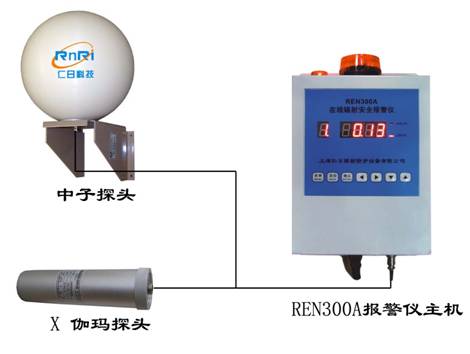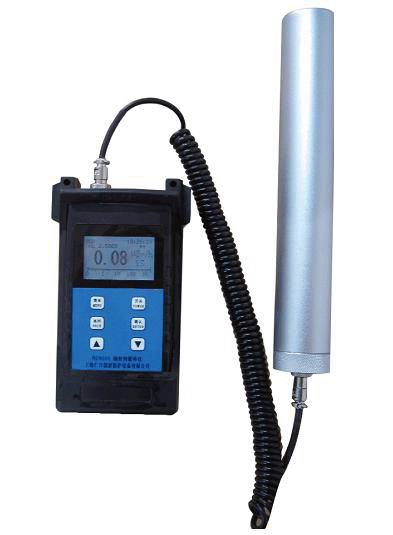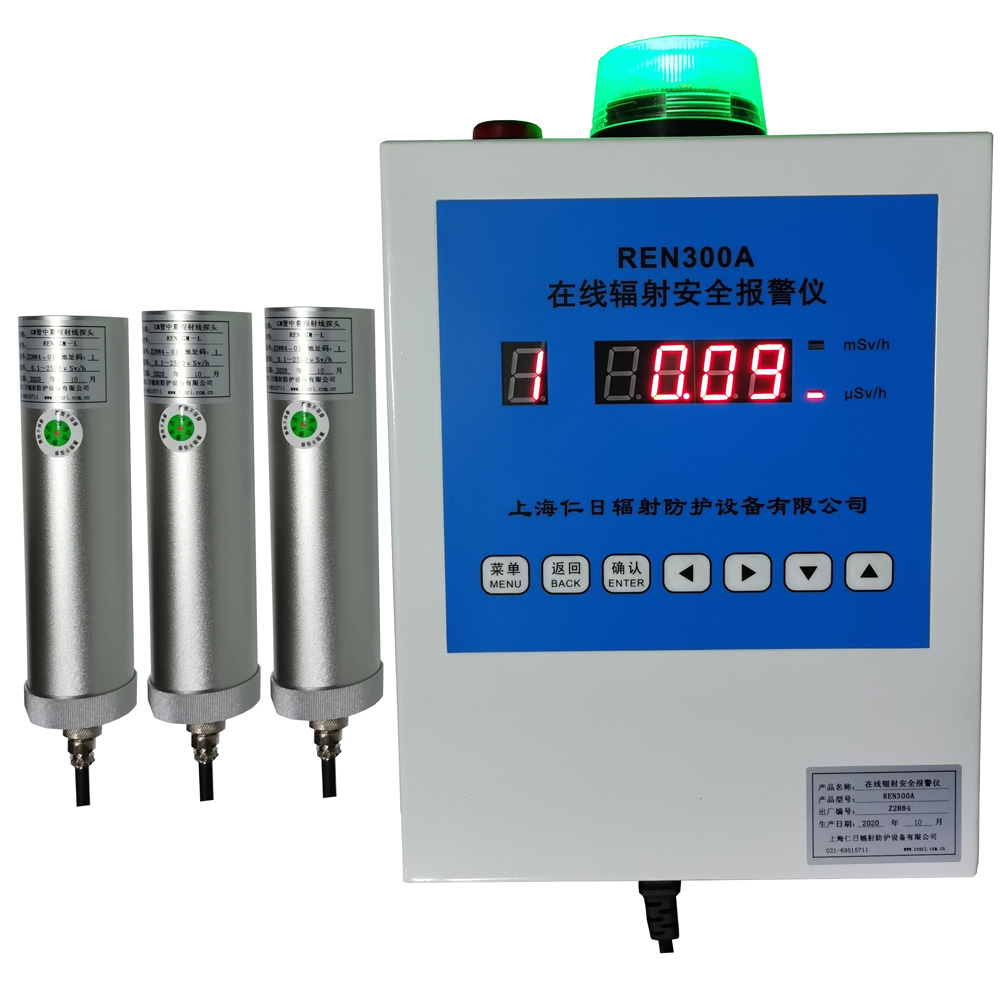


 REN600Bα、β表面污染檢測儀采用閃爍探測法,用來檢測放射性工作場所和實驗室的工作臺面、地板、墻面、手、衣服、鞋等表面受α或β(γ)放射性污染的程度,也可對密封型α、β同位素泄漏水平進行檢測。儀器具有較高的探測效率;此外通過配套的 RenRiRate輻射劑量管理軟件可將存儲的數據讀
REN600Bα、β表面污染檢測儀采用閃爍探測法,用來檢測放射性工作場所和實驗室的工作臺面、地板、墻面、手、衣服、鞋等表面受α或β(γ)放射性污染的程度,也可對密封型α、β同位素泄漏水平進行檢測。儀器具有較高的探測效率;此外通過配套的 RenRiRate輻射劑量管理軟件可將存儲的數據讀
 放射工作人員個人劑量委托監測服務
依據《GB18871-2002電離輻射防護與輻射源安全基本標準》和《GBZ128-2002職業性外照射個人監測規范》的要求,以熱釋光個人劑量計作為監測手段,為放射工作人員提供個人劑量委托監測服務,并為企業或衛生行政部
放射工作人員個人劑量委托監測服務
依據《GB18871-2002電離輻射防護與輻射源安全基本標準》和《GBZ128-2002職業性外照射個人監測規范》的要求,以熱釋光個人劑量計作為監測手段,為放射工作人員提供個人劑量委托監測服務,并為企業或衛生行政部
 本報警儀由REN300A在線輻射安全報警儀和REN-3He-N中子探頭和REN-GM-L X、伽瑪探頭組成。該輻射報警裝置是采用特殊設計的前置放大電路,具有靈敏度高、操作方便、自動顯示、數據存儲和超閾值報警等特點,能實時給出x射線、γ射線、中子射線的輻射劑量率。考慮到現場操作、應急快速響應的需要,主
本報警儀由REN300A在線輻射安全報警儀和REN-3He-N中子探頭和REN-GM-L X、伽瑪探頭組成。該輻射報警裝置是采用特殊設計的前置放大電路,具有靈敏度高、操作方便、自動顯示、數據存儲和超閾值報警等特點,能實時給出x射線、γ射線、中子射線的輻射劑量率。考慮到現場操作、應急快速響應的需要,主
 REN500型智能化χ、γ輻射儀采用高靈敏的閃爍晶體作為探測器,反應速度快, 和國內同類儀器相比,該儀器具有更寬的劑量率測量范圍。 該儀器除能測高能、低能γ射線外,還能對低能X射線進行準確的測量,具有良好的能量響應特性。此外通過配套的Re
REN500型智能化χ、γ輻射儀采用高靈敏的閃爍晶體作為探測器,反應速度快, 和國內同類儀器相比,該儀器具有更寬的劑量率測量范圍。 該儀器除能測高能、低能γ射線外,還能對低能X射線進行準確的測量,具有良好的能量響應特性。此外通過配套的Re
 REN300A在線輻射安全報警儀是一種新型的x-γ輻射連續監測報警裝置,它采用特殊設計的前置放大電路,具有靈敏度高、操作方便、自動顯示和超閾值報警等特點,能實時給出xγ輻射劑量率;儀器內置海量數據存儲功能,能存儲10年的歷史數據且標配提供強大的RenLocal輻射監測數據分析軟件。考慮
REN300A在線輻射安全報警儀是一種新型的x-γ輻射連續監測報警裝置,它采用特殊設計的前置放大電路,具有靈敏度高、操作方便、自動顯示和超閾值報警等特點,能實時給出xγ輻射劑量率;儀器內置海量數據存儲功能,能存儲10年的歷史數據且標配提供強大的RenLocal輻射監測數據分析軟件。考慮
 REN400型多功能輻射檢測儀是以內置高靈敏度蓋格計數管為探測器,外接不同類型的探頭來實現對低劑量χ、γ射線,高劑量χ、γ射線,α、β射線和中子射線的檢測。作為多功能輻射巡測儀,能顯示工作場所的輻射值,自動連續測量和記錄280萬條輻射劑量率數據,更換
REN400型多功能輻射檢測儀是以內置高靈敏度蓋格計數管為探測器,外接不同類型的探頭來實現對低劑量χ、γ射線,高劑量χ、γ射線,α、β射線和中子射線的檢測。作為多功能輻射巡測儀,能顯示工作場所的輻射值,自動連續測量和記錄280萬條輻射劑量率數據,更換
2006/9/9 10:05:00
氡從何處來?
室內氡的來源是多途徑的,但主要是:
1、巖石(土壤)是室內氡積累的普遍而直接的來源,而且是主要的來源(當居室中各類建材的放射性符合國家標準時)。
2、構造帶。構造帶不是直接的氡來源,但它是地下氡匯集和遷移的通道,有時比巖石因素更重要。例如某地房屋建在裂隙不很發育的花崗巖上,在相同的其他建材條件下,室內的氡往往要比房屋建在放射性較低,而裂隙發育又相當厲害的砂巖上為低。
3、水源有時也是室內氡的重要來源,直接來自地下的、鈾礦區或油氣田區的水往往有較高的氡濃度。
4、在房屋基底經完好密封時,墻地磚的放射性就成了室內氡的主要來源。
5、煤氣通常稱液化氣或天然氣,往往有著相對高的氡濃度。
氡對人體的主要傷害是什么?
專家們把氡稱為“導致人類肺癌的第二大‘殺手’”,是除吸煙以外引起肺癌的第二大因素。世界衛生組織把氡列為使人致癌的19種物質之一。
如何降低居室中的氡?
1、不要購買建筑在富鈾區、伽瑪高值區、斷裂構造區的樓宇。要知道室內的氡含量是否超標,最有效的方法就是進行室內氡濃底的檢測,個人購買住房時,也應考慮這個因素。
2、在裝飾裝修時,要盡量按照國家標準選用放射性含量低的建筑和裝飾材料。
3、室內裝飾中,要注意填平、密封地板和墻上的所有裂縫,特別是地下室、一層和平房的住戶更要如此。
4、做好室內通風換氣,這是最簡便、最省錢的方法。門窗關閉的房屋內,氡的濃度往往比敞開門窗時高數倍到數十倍。專家曾做過試驗,一間氡濃度在151貝可/m3 房間,開窗1小時后,室內氡濃度可降為48貝可/m3。如果配備優質的室內空氣凈化器更好。
5、孩子與婦女比成年男性更易受氡侵害,應盡量減少或禁止在室內吸煙。
國外相關報道:
美國環保署:http://www.epa.gov/radon/healthrisks.html
Lung cancer kills thousands of Americans every year. The untimely deaths of Peter Jennings and Dana Reeve have raised public awareness about lung cancer, especially among people who have never smoked. Smoking, radon, and secondhand smoke are the leading causes of lung cancer. Although lung cancer can be treated, the survival rate is one of the lowest for those with cancer. From the time of diagnosis, between 11 and 15 percent of those afflicted will live beyond five years, depending upon demographic factors. In many cases lung cancer can be prevented; this is especially true for radon.
Smoking is the leading cause of lung cancer. Smoking causes an estimated 160,000* deaths in the U.S. every year (American Cancer Society, 2004). And the rate among women is rising. On January 11, 1964, Dr. Luther L. Terry, then U.S. Surgeon General, issued the first warning on the link between smoking and lung cancer. Lung cancer now surpasses breast cancer as the number one cause of death among women. A smoker who is also exposed to radon has a much higher risk of lung cancer.
Radon is the number one cause of lung cancer among non-smokers, according to EPA estimates. Overall, radon is the second leading cause of lung cancer. Radon is responsible for about 21,000 lung cancer deaths every year. About 2,900 of these deaths occur among people who have never smoked. On January 13, 2005, Dr. Richard H. Carmona, the U.S. Surgeon General, issued a national health advisory on radon. Visit www.cheec.uiowa.edu/misc/radon.html7 for more on a study by Dr. William Field on radon-related lung cancer in women.
Secondhand smoke is the third leading cause of lung cancer and responsible for an estimated 3,000 lung cancer deaths every year. About 1,000 of these are people that never smoked, and about 2,000 are former smokers. Smoking affects non-smokers by exposing them to secondhand smoke. Exposure to secondhand smoke can have serious consequences for children’s health, including asthma attacks, affecting the respiratory tract (bronchitis, pneumonia), and may cause ear infections.
Learning more about lung cancer. The following sources provide a wide range of good information about lung cancer, prevention, and treatment.
Why is radon the public health risk that it is?
EPA estimates that about 20,000 lung cancer deaths each year in the U.S. are radon-related. Exposure to radon is the second leading cause of lung cancer after smoking. Radon is an odorless, tasteless and invisible gas produced by the decay of naturally occurring uranium in soil and water. Radon is a form of ionizing radiation and a proven carcinogen. Lung cancer is the only known effect on human health from exposure to radon in air. Thus far, there is no evidence that children are at greater risk of lung cancer than are adults.
Radon in air is ubiquitous. Radon is found in outdoor air and in the indoor air of buildings of all kinds. EPA recommends homes be fixed if the radon level is 4 pCi/L (pico Curies per Liter) or more. Because there is no known safe level of exposure to radon, EPA also recommends that Americans consider fixing their home for radon levels between 2 pCi/L and 4 pCi/L. The average radon concentration in the indoor air of America’s homes is about 1.3 pCi/L. It is upon this level that EPA based its estimate of 20,000 radon-related lung cancers a year upon. It is for this simple reason that EPA recommends that Americans consider fixing their homes when the radon level is between 2 pCi/L and 4 pCi/L. The average concentration of radon in outdoor air is .4 pCi/L or 1/10th of EPA’s 4 pCi/L action level.
For smokers the risk of lung cancer is significant due to the synergistic effects of radon and smoking. For this population about 62 people in a 1,000 will die of lung-cancer, compared to 7.3 people in a 1,000 for never smokers. Put another way, a person who never smoked (never smoker) who is exposed to 1.3 pCi/L has a 2 in 1,000 chance of lung cancer; while a smoker has a 20 in 1,000 chance of dying from lung cancer. Figure A compares the risks between smokers and never smokers; smokers are at a much higher risk than never smokers, e.g., at 8 pCi/L the risk to smokers is six times the risk to never smokers.
The radon health risk is underscored by the fact that in 1988 Congress added Title III on Indoor Radon Abatement to the Toxic Substances Control Act. It codified and funded EPA’s then fledgling radon program. Also that year, the Office of the U.S. Surgeon General issued a warning about radon urging Americans to test their homes and to reduce the radon level when necessary (U.S. Surgeon General).
Unfortunately, many Americans presume that because the action level is 4 pCi/L, a radon level of less than 4 pCi/L is ‘safe’. This perception is altogether too common in the residential real estate market. In managing any risk, we should be concerned with the greatest risk. For most Americans, their greatest exposure to radon is in their homes; especially in rooms that are below grade (e.g., basements), rooms that are in contact with the ground and those rooms immediately above them.
| Radon Level | If 1,000 people who smoked were exposed to this level over a lifetime*... | The risk of cancer from radon exposure compares to**... | WHAT TO DO: Stop smoking and... |
|---|---|---|---|
| 20 pCi/L | About 260 people could get lung cancer | 250 times the risk of drowning | Fix your home |
| 10 pCi/L | About 150 people could get lung cancer | 200 times the risk of dying in a home fire | Fix your home |
| 8 pCi/L | About 120 people could get lung cancer | 30 times the risk of dying in a fall | Fix your home |
| 4 pCi/L | About 62 people could get lung cancer | 5 times the risk of dying in a car crash | Fix your home |
| 2 pCi/L | About 32 people could get lung cancer | 6 times the risk of dying from poison | Consider fixing between 2 and 4 pCi/L |
| 1.3 pCi/L | About 20 people could get lung cancer | (Average indoor radon level) | (Reducing radon levels below 2 pCi/L is difficult.) |
| 0.4 pCi/L | About 3 people could get lung cancer | (Average outdoor radon level) | |
| Note: If you are a former smoker, your risk may be lower. pCi/L (pico Curies per Liter) * Lifetime risk of lung cancer deaths from EPA Assessment of Risks from Radon in Homes (EPA 402-R-03-003). ** Comparison data calculated using the Centers for Disease Control and Prevention''s 1999-2001 National Center for Injury Prevention and Control Reports. | |||
| Radon Level | If 1,000 people who never smoked were exposed to this level over a lifetime*... | The risk of cancer from radon exposure compares to**... | WHAT TO DO: |
|---|---|---|---|
| 20 pCi/L | About 36 people could get lung cancer | 35 times the risk of drowning | Fix your home |
| 10 pCi/L | About 18 people could get lung cancer | 20 times the risk of dying in a home fire | Fix your home |
| 8 pCi/L | About 15 people could get lung cancer | 4 times the risk of dying in a fall | Fix your home |
| 4 pCi/L | About 7 people could get lung cancer | The risk of dying in a car crash | Fix your home |
| 2 pCi/L | About 4 person could get lung cancer | The risk of dying from poison | Consider fixing between 2 and 4 pCi/L |
| 1.3 pCi/L | About 2 people could get lung cancer | (Average indoor radon level) | (Reducing radon levels below 2 pCi/L is difficult.) |
| 0.4 pCi/L | (Average outdoor radon level) | ||
| Note: If you are a former smoker, your risk may be higher. pCi/L (pico Curies per Liter) * Lifetime risk of lung cancer deaths from EPA Assessment of Risks from Radon in Homes (EPA 402-R-03-003). ** Comparison data calculated using the Centers for Disease Control and Prevention''s 1999-2001 National Center for Injury Prevention and Control Reports. | |||
產品名稱: RenriDecayPool放射性廢液衰變池在線監測系統
產品描述: 為了加強對放射性廢液排放的監督管理,保障人體健康,保護環境,根據《中華人民共和國放射性污染防治法》《電離輻射防護與輻射源安全基本標準》《 醫用放射性廢物的衛生防護管理》等相關法規與標準的要求,考慮人為操作失誤及放射性廢液錯誤排放后可能引發的嚴重環境危
產品名稱: REN300B型在線輻射安全報警儀
產品描述: REN300B在線輻射安全報警儀是一種新型的x-γ輻射連續監測報警裝置,它采用特殊設計的前置放大電路,具有靈敏度高、操作方便、自動顯示和超閾值報警等特點,能實時給出xγ輻射劑量率。考慮到現場操作、應急快速響應的需要,主機安裝在輻射現場,實現實時監測與就地報警,通過RS485通訊實現總控制室自動監控。
產品名稱: REN300+REN-3He-N型固定式中子、伽瑪報警儀
產品描述: 本報警儀由REN300在線輻射安全報警儀和REN-3He-N中子探頭和REN-NaI30伽瑪探頭組成。該輻射報警裝置是采用特殊設計的前置放大電路,具有靈敏度高、操作方便、自動顯示、數據存儲和超閾值報警等特點,能實時給出x射線、γ射線、中子射線的輻射劑量率。考慮到現場操作、應急快速響應的需要,主機安裝
產品名稱: 放射源儲存鉛箱
產品描述: 1、內徑 300×300×300mm2、商品描述: 鉛箱3、鉛當量: 5mmPb4、外表材質:不銹鋼5、上海仁日
產品名稱: REN800型中子周圍劑量當量(率)儀
產品描述: REN800型中子周圍劑量當量(率)儀 采用高靈敏的進口He-3管作為探測器,反應速度快。該儀器使用方便;靈敏度高、抗γ性能好、能量響應特性好,即可用作便攜式儀器又可用作固定式中子劑量監測儀。此外通過配套的RenRiRate輻射劑量管理軟件可將存儲的
產品名稱: REN-NaI30-Im浸入式放射性廢液射線探頭
產品描述: REN系列智能化輻射探頭均可和REN300、REN300A、REN300B系列主機配套使用,也可以單獨配套RenRiArea輻射區域監測軟件使用。且具有RS485/RS232的通訊能力。所有探頭均可單獨外接報警燈,在超閾值的情況下就地給出聲光報警。
產品名稱: REN510型便攜式γ譜儀
產品描述: REN510型便攜式γ譜儀主要用于安檢、反恐、核事故現場的污染分析,可進行γ輻射劑量的測量,同時系統內置核素庫,可以自動識別人工及天然同位素。儀器為一體式,內置2英寸NaI(Tl) γ探測器,可同時測量γ能譜、γ劑量率。儀器為全數字化,集探測器、成型放大器、多道分析器、電源、觸摸屏、內存為一體,功耗
產品名稱: 鉛屏風、鉛衣架、電離輻射警示牌、分源防護屏、鉛箱、注射器防護套、報警燈
產品描述: 單聯移動式防護屏風 1、規格尺寸: H×W:1800×900 (mm)2、商品描述: 上部鉛有機玻璃的高度為 H×W:240×240 (mm)3、鉛當量: 鉛玻璃0.5mmPb, 下部分鉛當量為0.5mmpb4、外飾材料:碳素鋼板噴

,伽馬射線檢測儀,伽馬射線測量儀,伽馬射線探測儀,伽馬射線探測裝置,伽馬射線監測儀器
上海仁日輻射防護設備有限公司(Shanghai Renri Radiation Protection Equipment Co., Ltd.) 上海仁日科貿有限公司 版權所有
電話:021-69515711 手機:13818065015 傳真:021-69515712 Email:market@renri.com.cn
QQ:1993509414 地址:上海市曹安路1509號福瑞大廈516室 郵編:201824
 滬ICP備09065761號-6
滬ICP備09065761號-6
 滬公網安備 31011402001956號
滬公網安備 31011402001956號
